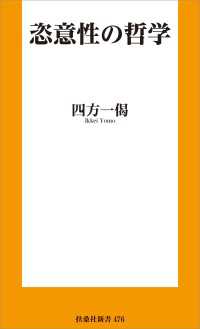Full Description
Formative assessment is one of the best ways to increase student learning and enhance teacher quality. But effective formative assessment is not part of most classrooms, largely because teachers misunderstand what it is and don't have the necessary skills to implement it.In the updated 2nd edition of this practical guide for school leaders, authors Connie M. Moss and Susan M. Brookhart define formative assessment as an active, continual process in which teachers and students work together—every day, every minute—to gather evidence of learning, always keeping in mind three guiding questions: Where am I going? Where am I now? What strategy or strategies can help me get to where I need to go?
Chapters focus on the six interrelated elements of formative assessment: (1) shared learning targets and criteria for success, (2) feedback that feeds learning forward, (3) student self-assessment and peer assessment, (4) student goal setting, (5) strategic teacher questioning, and (6) student engagement in asking effective questions. Using specific examples based on their extensive work with teachers, the authors provide:
Strategic talking points and conversation starters to address common misconceptions about formative assessment.
Practical classroom strategies to share with teachers that cultivate students as self-regulated, assessment-capable learners.
Ways to model the elements of formative assessment in conversations with teachers about their professional learning.
""What if"" scenarios and advice for how to deal with them.
Questions for reflection to gauge understanding and progress.
As Moss and Brookhart emphasize, the goal is not to ""do"" formative assessment, but to embrace a major cultural change that moves away from teacher-led instruction to a partnership of intentional inquiry between student and teacher, with better teaching and learning as the outcome.




![七田式・知力ドリル4・5・6さいすいり [バラエティ]](../images/goods/ar2/web/imgdata2/48614/4861486890.jpg)


